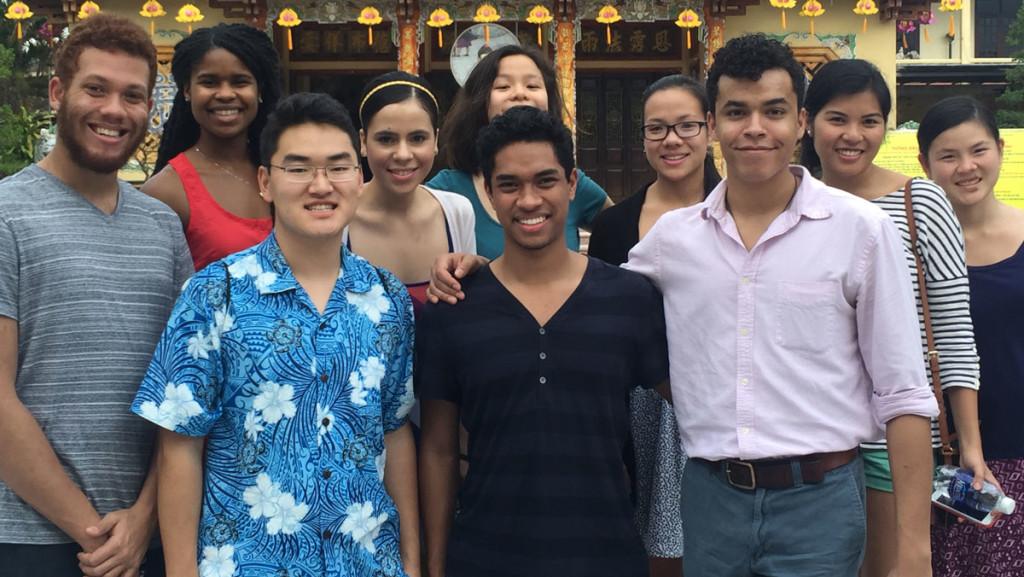In front of a crowd of approximately 120 people, Ithaca College’s graduating Martin Luther King Scholars described their struggles associated with assumptions made for their specific identities. Among others, one student discussed how people question his identity since he is black, white and queer. Another discussed the polarizing stereotypes of different socioeconomic classes.
The presentation, titled “More Than a Story of Oppression,” which took place April 21 in Emerson Suite B was part of a discussion series by the Center for the Study of Culture, Race and Ethnicity.
Seniors Alex Blanca, Shoshana Cuch, Imani Hall, Kenute Hammond, Luke Heisinger, Evan Layne, Hillary Nguyen, Evelio Perez, Zane Shephard, Sean Themea and Jacqueline Unger; junior Khalil Griffith, who will graduate in the spring; and Lia Munoz, who graduated a semester early but currently works at the college, presented at the event.
In the presentation, scholars identified personal struggles they faced as members of the college and the African, Latino, Asian and Native American community. After this short speech, two to three scholars performed a skit that involved the students’ “interviewing” to be a part of the ALANA community.
The interview skits included an interviewer attempting to box students into certain categories or characteristics by asking questions based on stereotypes of their identities. For example, when interviewing a student who was adopted from China, the interviewer asked how much that student values education and studying. In another interview, a student who was from a low-income area was asked if he thought going to college made him better than those from his neighborhood.
Hall said the interview idea came from personal struggles students face.
“I think it’s a representation of what it feels like when coming into a community,” Hall said. “It feels like an interview, and if not everything fits, then it’s ostracizing.”
In one speech, Layne discussed the struggles he faced identifying as a person who is black, white and queer.
“Whether I was stealing from one group, ripping off from another or swindling a third, I carried this sense of guilt as though any step I took could land me in hot water,” Layne said. “Being lost in this state of not belonging is like some kind of sick purgatory. I am constantly needing to perform some action or prove to some group or some audience that you are worthy — that I am valid.”
Layne said the scholars began preparing for this event during the last few weeks. Even though the senior MLK Scholars host a presentation like this every year, Layne said he was surprised by the turnout. A portion of the audience even had to stand along the walls of the room.
Zihui Adams, a junior MLK scholar, said the high attendance may be linked to the student protests in the fall involving POC at IC.
“This one was cool in that it was talking about beyond community, which I think was perfect because of all the things that were going on with the POC at IC movement,” Adams said. “Talking about how there’s so many other kind of events that are going on about multiculturalism, about panracial coalitions and stuff like that. I think it’s important people are aware of these things.”
To create awareness, the Student Leadership Institute offered this event as an SLI credit for students. Freshman Jeffrey Taylor attended the event to listen to senior scholars and received credit.
“This event highlighted things on campus that people have to deal with as daily issues,” Taylor said. “Some people had to talk about things that are hard to talk about. It was very impressive for them to share something that’s so personal.”
As far as sharing those details, Layne said, audience members might have different takeaways from the event.
“Similar to what was mentioned in the content of the presentation, every audience member is going to get something different out of it because depending on what part was most salient or most impactful for them,” Layne said.
Hall said he hopes the college community can use the dialogue from the event to respond to the student protests that happened in the fall.
“For Ithaca College to move forward and to truly critique itself in its level of community, it needs to have measures of self–critique in place, but also, the people have to be engaged in these conversations continuously,” Hall said.








